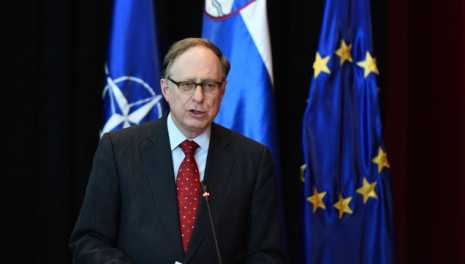Deputy Secretary General calls for efforts to strengthen non-proliferation regime
Szöveg: honvedelem.hu / nato.int | 2016. május 11. 11:00NATO Deputy Secretary General Ambassador Alexander Vershbow opened the twelfth annual NATO Conference on Weapons of Mass Destruction (WMD) Arms Control, Disarmament, and Non-proliferation in Ljubljana, Slovenia on Monday (9 May 2016).
“In recent years there have been many positive developments in the field of arms control and non-proliferation," Ambassador Vershbow said. He underlined the importance of the New START Treaty, which reduces the number of nuclear weapons and launchers the United States and Russia can deploy. He further highlighted the importance of last year’s nuclear negotiations with Iran which led to the Joint Comprehensive Plan of Action, calling this “a landmark agreement."

Ambassador Vershbow noted that the threat posed to NATO nations by the proliferation of ballistic missiles continues to increase. “Our ballistic missile defence is designed to defend our territory, our people and our forces against a range of threats from outside the Euro-Atlantic area, and is purely defensive," he said, adding: “NATO’s missile defence is not directed against a specific country, and that includes Russia."
The Deputy Secretary General stressed that NATO is enhancing its preparedness to defend against chemical, biological, radiological and nuclear (CBRN) attacks, including through the Joint CBRN Defence Centre of Excellence; the Combined Joint CBRN Defence Task Force; and the NATO Intelligence Fusion Centre. “One of the main things we can do is to improve coordination," he said; “that is why we work closely with our partners in the Euro-Atlantic Partnership Council, the Mediterranean Dialogue and the Istanbul Cooperation Initiative." He added that NATO’s Science for Peace and Security programme is helping facilitate CBRN first responder training with some southern partner nations.
Other conference participants include a number of senior officials including Ambassador Ahmet Üzümcü, Director-General of the Organisation for the Prohibition of Chemical Weapons (OPCW), and Dr. Lassina Zerbo, Executive Secretary of the Comprehensive Nuclear-Test-Ban Treaty Organization (CTBTO).
While in Ljubljana, Deputy Secretary General met with the President of Slovenia, Borut Pahor, and with the State Secretary at the Slovenian Foreign Ministry, Darja Bavdaž Kuret.